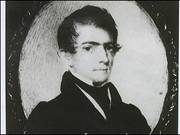Andrew Jackson Wins Duel, 1806
The quarrel started over a horse race.
Jackson owned a horse named Truxton, of whom he was very proud. Joseph Erwin, a neighbor, owned a horse named Ploughboy, with whom he was equally pleased. Erwin challenged Jackson to a horse race, Jackson accepted, and the race was scheduled. Then Ploughboy went lame, and the race was called off. Erwin paid a forfeit. There had been heavy betting among Jackson and Erwin's friends and associates, and some disputes took place.
Erwin's son-in-law, Charles Dickinson, was one of the most vehement, possibly because he was one of the most heavily liquored. He was also bitterly jealous of Jackson -- they were rival lawyers in the same community at the time. Dickinson continued to bad-mouth Jackson at every chance he got, and not just about the race.
 |
| Rachel Donelson, not quite divorced. |
Jackson called Dickinson a "base poltroon and a cowardly talebearer." Dickinson called Jackson a "worthless scoundrel, a base poltroon, and a coward." Both Jackson and Dickinson had friends who were eager to urge the quarrel along, for both personal and political reasons.
Dickinson's denunciation of Jackson was actually printed in the Nashville Review, so there was no ignoring it. Jackson challenged Dickinson to a duel.
 |
| Charles Dickinson, the man Jackson killed. |
Dickinson fired. Jackson remained standing, apparently unhurt. Dickinson exclaimed, "Great God! Have I missed him?" Jackson then took aim, but the pistol locked at half-cock. According to dueling etiquette, this was not a fire, so Jackson still had his shot. He took careful aim and fired, gut-shooting Dickinson. Dickinson died two hours later at a hotel.
 |
| Jackson in old age. |
Henry VIII Weds Jane Seymour, 1536
 |
| Portrait by Hans Holbein |
Jane had been a lady in waiting to both Katherine of Aragon and Anne Boleyn. She was said to have a child-like face and a modest demeanor. The court took a very different turn once Jane became queen. Gone were the extravagant entertainments of Anne Boleyn's court, and instead there was a strict observation of court protocol and decorum. There were rules about such details as how many pearls could be sewn into a lady's skirt. Of course, the French fashions that Anne had introduced to court were now banned.
Although generally not getting involved in political matters, Jane did endeavor to restore the Princess Mary to the line of succession. Henry refused, but Jane did manage to reconcile the two on a personal level.
Jane gave birth to the future King Edward IV on October 12th, 1537. Her labor lasted two days and three nights. She died on October 24th, 1537, of complications from the delivery, probably either a retained placenta or puerperal fever.
Pearl Hart Robs a Stage Coach, 1899
 |
| Pearl's mug shot. |
Pearl Hart was born Pearl Taylor in 1861 in Lindsay, Ontario, the daughter of religious and affluent parents. At the age of 16 she eloped with a young man named Hart -- Brett, William, or maybe Frank, take your pick, details about his name are a little contradictory. He was said to be a rake and a gambler, and undoubtedly a drunkard as well. Pearl soon found him abusive and returned to her parents. The couple would separate and reconcile several times throughout their marriage. The pair had two children, which Pearl left in the care of her mother.
At the age of 22, Pearl and her husband attended the Chicago World's Fair where he worked as a midway barker. Pearl was fascinated by the Wild West shows, and, when the Fair was over, she went to Colorado with a piano player named Dan Bandman. Soon she split with Bandman, and went from town to town working as a cook, singer, and probably a prostitute. She was said to enjoy the benefits of tobacco, alcohol, and morphine.
In 1898, Hart was working in Mammoth, Arizona, either working as a cook, or running a brothel near a local mine. When the mine closed, her income dried up. She also received a message from her mother, who was seriously ill and wanted her to return, but she had no money for travel.
Hart and a friend, Joe Boot (probably an alias), tried working a mining claim that he owned, but were not successful. Plan B was for them to rob the Globe to Florence stage coach.
There had been no stage coach robberies in the area for some time, so the coach didn't have a shotgun attendant. Hart and Boot stopped it, took the $431.20 it contained, as well as two firearms belonging to passengers and the driver's revolver. Hart then returned $1 to each passenger and the pair rode away. Hart had cut her hair short and dressed in men's clothing.
The pair was arrested on June 5th, and Hart was transferred to Tucson, while Boot remained in Florence. (Florence didn't have accommodations for female prisoners.) The room in which Hart was held was made of lathe and plaster, and Hart managed to dig an 18-inch hole through the wall and escape. She was captured two weeks later.
 |
| Pearl in her jail cell. |
In December of 1902, Hart received a pardon from Governor Alexander Brodie, on the condition that she would leave the territory. The reason for the pardon is unknown. There was, however, a rumor that Hart was pregnant at the time, and that knowledge of the fact would embarrass the prison. Since Hart apparently never had a third child, it may have been a ploy on her part.

No comments:
Post a Comment